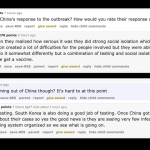Despite Trump having said he will stop using the term "Chinese virus" or "Wuhan virus" a few days ago, the U.S. is still actively pushing the world to buy the idea that China covered up its coronavirus outbreak, a cover up which directly lead the world to suffer a pandemic. The G7 just failed to issue a joint statement because the U.S. kept pushing for a statement about a … [Read more...] about How China Covered up the Coronavirus Crisis
china-u.s. relations
If China and the U.S.-led Hegemonic Block Ever Gets into a War, the War Started this Way … with a Lie…
The U.S. is know for lying about everything to start wars that destroy lives, peoples, nations... (see e.g. the book titled "War is a Lie"). That has been clearly the case for Iraq, Libya, Afghanistan, Syria... perhaps also Sudan. But is the U.S. also sowing the seeds, planting the lies, to justify it going to war with China? With all my heart, I certainly hope not. But … [Read more...] about If China and the U.S.-led Hegemonic Block Ever Gets into a War, the War Started this Way … with a Lie…
A New U.S. China Diplomatic Row a la Devyani Khobragade?
Yesterday, the U.S. Justice Department indicted five Chinese nationals of the Chinese military, living in China, with cyber espionage in the U.S. against American companies. China has reacted emphatically, calling the allegations trumped up and hypocritical (see, e.g., this xinhua article). According to this Washington Post Report, The Justice Department has indicted five … [Read more...] about A New U.S. China Diplomatic Row a la Devyani Khobragade?
Making a Mockery of China’s Air Defense Identification Zone (ADIZ) – and the Precedents it Sets?
Wow, here is an update on the China ADIZ and the recent aftermath. While I did expect U.S. and Japan to express some kind of reservation over China's recent establishment of an Air Defense Identification Zone in the East China Seas, I had not anticipated the full sound and fury of the storm! Within hours after China's public announcement of the ADIZ, the U.S. decided to … [Read more...] about Making a Mockery of China’s Air Defense Identification Zone (ADIZ) – and the Precedents it Sets?
Opinion: Free the Lewchew Islands from Japan
On May 8, Japan's government lodged a "strong protest" with the Chinese government over an article that had run in the People's Daily in which two academics questioned the basis of Japan's sovereignty over the Lewchew 琉球 (in Japanese, Ryukyu) islands. The Chinese side of course rejected the protest, and opinion columnists the world over have been weighing in. The current press … [Read more...] about Opinion: Free the Lewchew Islands from Japan



